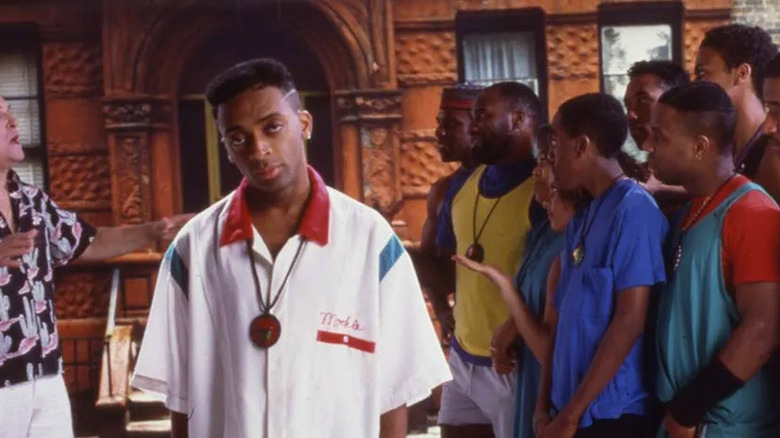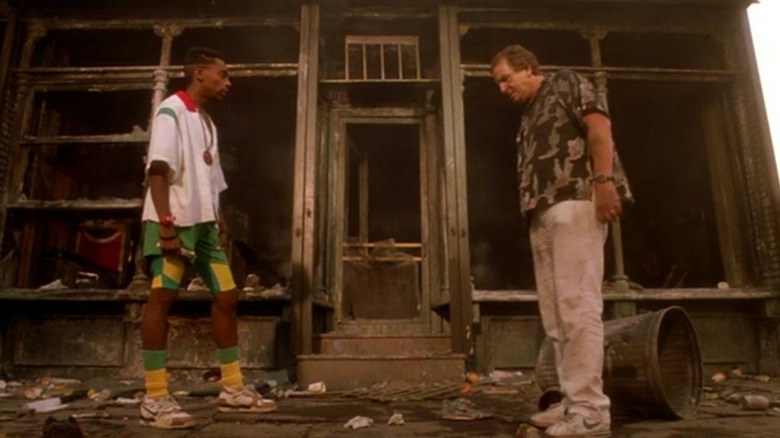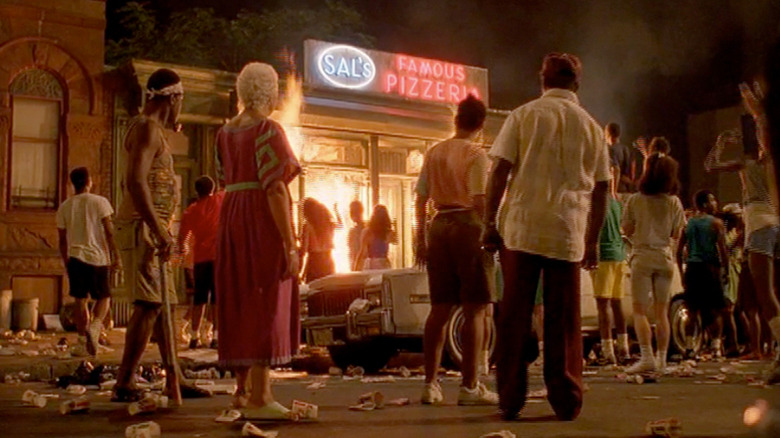Trying To Meddle With The Ending Lost Paramount Spike Lee's Do The Right Thing
Hollywood has always shown a preference for films that offer reconciliation between their Black and white subjects. And as a result, the industry is notoriously skittish with the work of Spike Lee. There's been a pattern, especially at the Academy Awards, where Lee's films are concerned: the director is consistently snubbed in favor of films that comfort white audiences — films like "Driving Miss Daisy," which took home the Oscar for Best Picture in 1990 while "Do The Right Thing" was shut out from the category altogether.
Lee's incendiary third feature bred a fair amount of controversy. Set over one sweltering summer day in New York neighborhood Bed-Stuy, "Do The Right Thing" is a pressure cooker for interracial tension. The film follows the patrons and employees at a pizza joint owned by Sal (Danny Aiello) and operated by his two sons. It's the site of a particularly gruesome instance of police brutality, which ends with the death of a local and a riot instigated by Sal's delivery guy, Mookie (Lee).
There are few directors more inspired by real life than Lee. "Do The Right Thing" was itself influenced by the deaths of two Black Americans in New York: Michael Stewart, who died in police custody in 1983, and Michael Griffith, killed in the Howard Beach racial incident of 1986. The subject matter was as timely then as it is now — and just as art imitated life, some feared that "Do the Right Thing" would incite the same civil unrest that goes down in the film.
Hugging it out?
"Do the Right Thing" was initially slated for a theatrical release with Paramount. At this point, the film was still in its script form, and — aside from a few small differences — was pretty true the story Spike Lee brought to the screen. The film closes on a confrontation between Mookie and Sal after the riot the former started completely destroys Sal's pizzeria. Mookie returns to claim his salary, and after another heated argument, the two eventually come to a (reluctant) truce. There might be strife in their relationship, but it's clear they care for each other in some unspoken way. Producers at Paramount, however, worried that their reconciliation wasn't strong enough.
"At the last minute, Paramount wanted Mookie and Sal to hug at the end of the movie," Lee told The Hollywood Reporter in 2019. Naturally, Lee believed that gesture would undercut his message in a major way. He immediately set out to find a backer that would respect his vision — and he found it in Universal Pictures president Tom Pollock:
"I had a friend who was an executive at Universal. It was a Friday. I called him up and he got the script that day. He gave it to [executive] Sean Daniels. And Daniels read it and gave it to Tom Pollock. Friday, the end of the workday, we're at Paramount. Monday, we were at Universal."
'They weren't taking into account that art imitated life'
Tom Pollock was fearless in the face of the backlash that "Do the Right Thing" could have incurred, though by all accounts he had every right to be skittish. "People forget that Tom Pollock had just went through hell with Scorsese's 'Last Temptation of Christ' when he received death threats," Lee added. "So, he could have easily said to me, 'Spike, I can't put my family through this again.' He didn't do that. Tom Pollock was not scared at all."
With Universal's support, "Do the Right Thing" went on to premiere at the 1989 Cannes Film Festival. While it was well-received by critics in Europe, critics back home shared the same worries as the Paramount execs. "You had white film critics fear mongering about the violence it might incite," said Joie Lee, sister to Spike. "They weren't taking into account that art imitated life, that the film was representational of the sociopolitical and racial climate of the U.S. and, in particular NYC, which was the hotbed of racially motivated hate crimes."
"These reviews were absolute racism," Lee added. "Blood was going to be on my hands. 'Spike Lee is playing with dynamite.' The film would spark riots." And while the film did light a spark in many audiences, it wasn't towards violence. 30 years on, "Do the Right Thing" remains one of Lee's defining works. Though the film was snubbed for Best Picture at the Academy Awards, it launched Lee into the stratosphere, and cemented him as a director that refuses to pull his punches. It just goes to show that you can't let fear get in the way of a good story.


